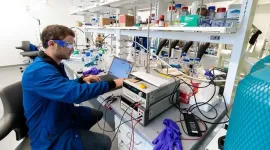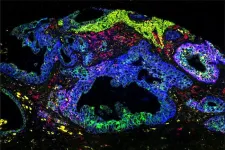(Press-News.org) Governments and other policymakers around the world wrestle with how to deal with people who are sceptical of official positions and guidelines, such as climate sceptics and antivaxxers.
Earlier research has linked such scepticism to distrust of scientists among members of the public, while other studies have shown that it is difficult to erode sceptical attitudes that are psychologically motivated by factors such as bias against elite institutions or a conservative world view.
New research from the University of Cambridge, reported in the journal PLOS ONE, suggests a more tailored approach could help dispel some of this scepticism, which could have implications for the way governments deal with scepticism among their constituents.
“The research shows that there are other approaches than addressing these issues in a one-size-fits-all manner,” said study co-author Dr Zeynep Clulow from Cambridge Judge Business School. “There are different types of sceptics, so this requires different strategies aimed at dispelling scepticism.”
“These findings can help policymakers develop more targeted strategies and focus more attention on groups that are persuadable, rather than being resigned to considering every sceptic to be some consistent conspiracist on every issue,” said co-author Professor David Reiner, also from Cambridge Judge Business School.
The research analysed the drivers of scepticism toward climate change and Covid-19 vaccination, based on a survey taken in early 2021 by polling firm Ipsos Mori, when most countries had been through the first wave of the pandemic and begun rolling out vaccination programmes. Nationally-representative samples of 2000 people were polled in each of eight countries: Australia, Brazil, China, India, Japan, South Africa, the UK and the US.
The study found that while the vast majority of people support Covid-19 vaccinations and recognise the threats posed by climate change, there were small groups who are sceptical of either climate change or Covid-19 vaccination, and an even smaller group who were sceptical of both.
For this smaller group of ‘double sceptics’, their attitudes were motivated by an underlying sceptical mindset, which was distrustful of institutions in general, including scientists and mainstream media.
Single-issue sceptics, in contrast, were primarily distrustful of scientists. The research found that people who completely distrust scientists were approximately four times more likely to be antivaxxers and five times more likely to be climate sceptics than double sceptics.
According to the researchers, this distinction suggests that efforts to overcome isolated predictors of scepticism – such as building trust in scientists, economic support and information campaigns – are more likely to boost support for policies designed to create societal responses to global challenges.
The same is not true for double sceptics: such strategies are likely to be ineffective or even counter-productive for people whose scepticism is associated with a more generalised sceptical worldview.
Double sceptics tend to possess many of the typical sceptic characteristics such as high distrust in social institutions and right-wing political orientation, which are collectively suggestive of an underlying sceptic mindset rather than a specific distrust of scientists.
Reasons why distrust in scientists might drive scepticism on climate change and Covid-19 vaccination include the complex nature of both issues that make it difficult for non-scientists to fully understand, and the financial and behavioural costs related to mitigation of these issues.
The surveys asked respondents to rate their trust in university scientists as part of a broader question that also probed trust in institutions and actors ranging from corporations to environmental NGOs to television news. They were also asked to rate trust in certain specific sources, including oil and gas companies, Greenpeace, Greta Thunberg, and social media.
While many respondents showed some degree of scepticism (35% did not consider climate change a major threat to their country, and 17% were unlikely to take a Covid-19 vaccine if offered one), only a very small minority (1.4%) chose the most sceptical response towards both issues. Even in the United States, only 4% of respondents were sceptical towards both issues and that group was less than 2% of the sample in the other seven countries. Similarly, less than 5% of respondents in six countries completely dismissed the threat of climate change (Australia at 9% and the US at 14% were higher).
The research also found that scepticism is inversely related with education, science knowledge, and perceived responsibility for combating climate change. Scepticism was higher among men, people who distrust television, and those with right-wing political views.
The researchers also found that people who prioritised the economy over the mitigation of climate change or Covid-19, or both, were significantly more likely to distrust scientists.
The researchers note two important limitations of their study sample: respondents in emerging economies were recruited from urban centres, so the views of rural citizens may not be accurately reflected; and Chinese respondents were not asked about their political views.
The other caveat is that the survey was taken when almost no one had received the Covid-19 vaccine and when many countries were still under some form of lockdown.
“While acknowledging that this was a particularly unusual time, we expect the finding that double sceptics comprise a small fraction of total pool of sceptics to be robust and we would expect to see this finding extended to other topics,” said Clulow.
“Painting all sceptics as irredeemable conspiracists is both counterproductive and incorrect,” said Reiner. “Most climate sceptics are not very concerned about taking a vaccine and vice versa. Most sceptics are single-issue sceptics and will need to be engaged on the specifics of the issue, which will, no doubt, be challenging, but they do not exhibit the more fundamental, all-encompassing scepticism we find among double-sceptics that extends to all societal institutions and media outlets.”
END
How do ‘double skeptics’ affect government policy on climate and vaccination?
2024-10-02
ELSE PRESS RELEASES FROM THIS DATE:
Electric vehicle owners on average are richer, drive more than the general population, and have a higher than average carbon footprint due to higher disposable income—but owning an EV reduces their tr
2024-10-02
Electric vehicle owners on average are richer, drive more than the general population, and have a higher than average carbon footprint due to higher disposable income—but owning an EV reduces their traffic related emissions, and their personal experience of EVs is linked with positive attitudes and purchase intentions
####
Article URL: https://journals.plos.org/climate/article?id=10.1371/journal.pclm.0000346
Article Title: But can it drive to Lapland? A comparison of electric vehicle owners with the general population for identification of attitudes, concerns and barriers related to electric vehicle adoption in Finland
Author Countries: ...
Toward brain-based prediction of recovery: how neuroimaging can help combat the substance-use epidemic
2024-10-02
The Brain & Behavior Research Foundation (BBRF) is hosting a free webinar, “Toward Brain-Based Prediction of Recovery: How Neuroimaging Can Help Combat the Substance-Use Epidemic” on Tuesday, October 8, 2024, at 2:00 pm ET. The presenter, Sarah W. Yip, Ph.D., MSc, is an Associate Professor of Psychiatry at Yale School of Medicine and the Director of the Yale Imaging and Psychopharmacology (YIP) Lab. Her lab uses neuropsychiatric research methods to identify biological mechanisms of mood disorders, addictions, and their treatments. The webinar ...
Beyond ‘one pore at a time’
2024-10-02
Nanoporous membranes with atomic-scale holes smaller than one-billionth of a meter have powerful potential for decontaminating polluted water, pulling valuable metal ions from the water, or for osmotic power generators.
But these exciting applications have been limited in part by the tedious process of tunneling individual sub-nanometer pores one by one.
“If we are to ever scale up 2D material membranes to be relevant for applications outside the laboratory, the ‘one pore at a time’ method just isn't feasible,” said recent UChicago Pritzker School of Molecular Engineering (PME) PhD graduate Eli ...
New study explores how universities can improve student well-being
2024-10-02
Historically, a university’s primary role has been to ensure students excel academically, but higher education can also change lives by supporting their well-being. Despite growing evidence of the importance of student well-being and an abundance of best practices, most institutions have yet to prioritize it as much as they do enrollment, graduation and grades.
A new study led by University of Maine researchers provides guidance on how institutions can support and enhance student well-being, and breaks down the various benefits for learners during and beyond their university career. It was published in PNAS Nexus, the ...
Community-based programs in senior centers may lower health care use and costs for people with dementia
2024-10-02
Living with dementia in communities with senior centers providing access to adult day health and social services was associated with fewer hospitalizations and lower health care use and Medicare costs, according to researchers from Rutgers University-New Brunswick and the University of Massachusetts Boston.
The results, published in Heath Affairs Scholar, underscore the potential of senior centers in minimizing health care costs and acute care usage among those with dementia, particularly in smaller communities where centers provide access to such services.
“Our findings provide evidence to support ...
Q&A: UW researchers examine link between light pollution and interest in astronomy
2024-10-02
Picture walking outside on a dark, cloudless evening. You look up to admire the stars — maybe even a planet, if you’re lucky — and a sense of wonder washes of you. New research from the University of Washington shows this might be more than a memorable experience: It could ultimately spark scientific curiosity and influence life choices.
Rodolfo Cortes Barragan, research scientist the UW Institute for Learning and Brain Sciences (I-LABS), and Andrew Meltzoff, co-director of I-LABS and professor of psychology, recently co-authored a study in Nature Scientific Reports showing a link between the ability to see the stars ...
PCORI awards $37 million to accelerate implementation of evidence-based health research
2024-10-02
WASHINGTON, D.C., Oct. 2, 2024 — The Patient-Centered Outcomes Research Institute (PCORI) today announced $37 million in funding awards through its Health Systems Implementation Initiative (HSII). These awards will support 25 projects implementing PCORI-funded comparative clinical effectiveness research (CER) findings in participating HSII health systems.
Key Points:
Twenty-five HSII participant health systems, covering more than 2,300 care sites across the country, received PCORI funding awards.
HSII implementation projects will focus on one of two main areas:
Improving antibiotic ...
Researchers develop insights into KRAS mutations in pancreatic cancers
2024-10-02
A common mutation in the KRAS gene is associated with improved overall survival in pancreatic ductal adenocarcinoma (PDAC) compared with other variants, in part because the mutation appears to lead to less invasiveness and weaker biological activity, according to a multicenter study conducted at Weill Cornell Medicine, NewYork-Presbyterian, Memorial Sloan Kettering Cancer Center, and other institutions.
The research, published August 29 in Cancer Cell, demonstrates that KRAS mutations, which occur in about 95 percent of people who ...
New CAMH-led study highlights effective treatment for male postpartum depression
2024-10-02
(Toronto, Canada) – A new study from the Centre for Addiction and Mental Health (CAMH), in collaboration with leading researchers in Pakistan, has demonstrated the effectiveness of an integrated psychosocial intervention aimed at improving parenting skills and symptoms of depression. The treatment was effective for male postpartum depression (PPD) in a cohort of Pakistani fathers, improving both paternal mental health and child development outcomes.
“Male mental health, and especially postpartum depression in fathers, remains a stigmatized and understudied area,” says Dr. Ishrat Husain, the study's lead investigator and senior ...
Global study highlights the life-saving impact of Guideline-Directed Medical Therapy (GDMT) in heart failure patients
2024-10-02
Heart failure is a rapidly growing public health issue that can be difficult to manage on a global scale. But there are tools that exist that can improve outcomes, such as guideline-directed medical therapy (GDMT). New UCLA-led research highlights the important role that these guidelines can play in reducing mortality rates for individuals suffering from heart failure with reduced ejection fraction (HFrEF), a type of heart failure affecting an estimated 29 million people worldwide.
“These guidelines are being significantly underutilized in clinical settings globally and there ...





